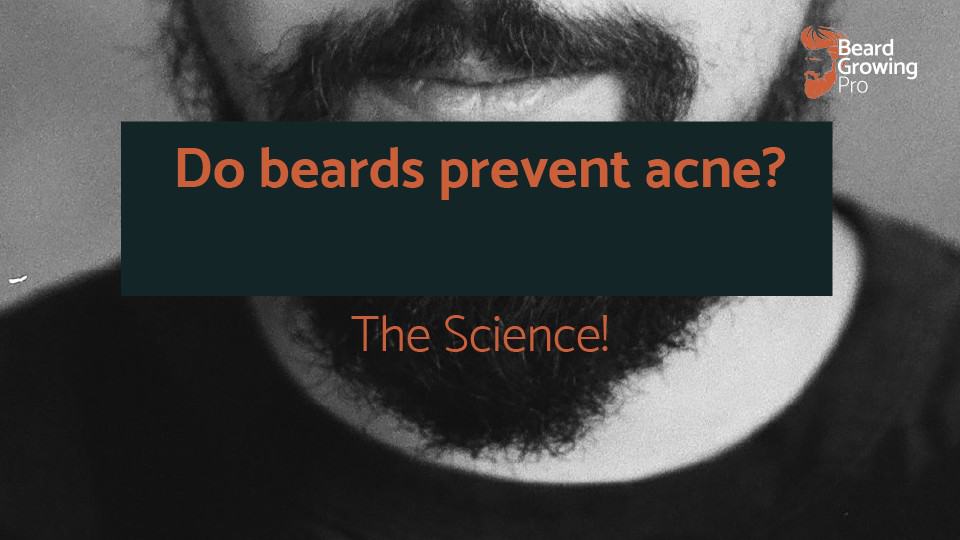Acne is one of the most common dermatological issues that teenagers face. Acne is found to affect industrialised countries much more than developing countries. And acne is incredibly low in certain ethnic groups. But is this to do with the fact that these ethnic groups can grow a beard? Is it that these developing countries are not subject to the same chemical environment as in industrialised countries? Or, is it simply that growing a beard is able to influence the amount of acne that develops? In this article I have gathered together the science and research which exists to answer this question: do beards prevent acne?
No, beards have not been shown by science to prevent acne. A study performed in 2014 found that the main risk factors of acne was facial hair growth in boys followed by being overweight or obese and having a history of acne from both parents. There is also a study which was published in 2016 which recommended that shaving with a multi-blade razor on a daily basis can help reduce acne caused by ingrown hairs.
So, from the two studies that I have found it is clear that having a beard is a risk factor and that daily shaving is one of the best ways that you can reduce the prevalence of acne on your face. However, there was a vice article published in 2017 which showed that an author was able to solve his lifelong acne problem by growing a beard. So, the science doesn’t necessarily correlate 100% in individual cases.
It could be that your genes are dictating that your face will be more prone to the development of acne. There are a variety of triggers that are discussed among teenagers such as chocolate, fatty foods, and dairy products. And there is also a correlation between your body mass index and the prevalence of acne on the face.
Therefore, it could be that one of these factors is determining the production of acne on your face rather than the amount of facial hair that you have. Acne is an annoying and complicated issue which we will take a look at in more detail in this article.
Article Contents
Do beards cause acne?
All of the science-based articles and directives that I’ve looked at suggest that pimples and acne are made worse by having a beard. So, yes beards are likely to be correlated with the prevalence of acne.
Yale medicine suggests that the reason that you get increased amount of acne with beards is because acne develops when the skin produces a lot of oils and sebum. This, in combination with dead skin cells and being trapped against the skin causes breakouts.
So, why do some people recommend growing a beard to solve acne? Well, it could be that their skin problems have nothing to do with the issues that create acne but rather are due to ingrown hairs. If you have a particular problem with ingrown hairs on your face you could have Pseudofolliculitis barbae.
Could it be Pseudofolliculitis barbae instead of ache?
Pseudofolliculitis barbae is an inflammatory condition of the beard area. It seems to be more prevalent in men of an African descent and it can expect both men and women. There is a study published in 2016 which looks at the condition and also the role of facial grooming in making it worse.
Prior to this study there was not any robust clinical evidence to support recommendations about shaving or not shaving with single blade or multi-blade razers. The study highlights that daily shaving which includes a good pre-shave and post shave hydration may be beneficial to stop the development of ingrown hairs.
Daily shaving with a multi-blade razor will reduce the pressure that you put on your skin and also reduce the irritation from having to pass over the same part of the face over and over again.
This study would also correlate well with the experience of the journalist in the vice article which suggest that growing a beard solved and acne problem. It was in fact acne caused by this condition rather than acne caused by sebum and overproduction of oil being trapped next to the skin surface.
It can be a little bit confusing because the symptoms of acne and Pseudofolliculitis barbae are very similar but are tackled in slightly different ways.
So, let’s have a look at the correlation between acne and facial hair in the scientific literature.
Correlation between acne and facial hair
There is a positive correlation between acne and facial hair as confirmed by a study performed in 2014.
This study looked at the prevalence and risk factors of adolescent acne in schoolchildren in Lithuania. They wanted to find out if they could associate the prevalence of acne among schoolchildren with the onset of puberty, body mass index, acne history of parents, nutritional habits, smoking and alcohol consumption.
The study was conducted on 1277 school-aged pupils between the ages of seven and 19 years old. The children were interviewed with questionnaires and were examined by a specially trained dermatologist.
Find that acne was prevalent in about 82.9% of respondents and it was strongly age dependent with the highest rates in age groups of 13 to 19 years old. The main risk factors of developing acne for men was facial hair growth. This signified that the boys were in their early or late stages of puberty and combined with other factors such as being overweight, having an acne history from both parents was a strong indicator that the boy would suffer from acne. Interestingly, the study did not find any correlation between acne and nutritional habits, smoking or alcohol consumption.
Although this study does not confirm that beards cause acne it does show a positive correlation between beard growth and acne. This means that the hormonal changes that happen during puberty have an impact on the body to the point where beard growth and acne both increase At the same time but one does not cause the other.
This makes sense as during puberty your face produces more oil is at the same time as growing facial hair. However, it makes sense that the more the oil and dead skin cells get trapped at the surface of your skin it could end up blocking pores and causing more acne to appear. This is backed up by dermatologist from Yale University.
Advice from Yale medicine suggests that you can do these things to stop your beard producing pimples and acne:
- Wash your face twice a day using a gentle skin cleanser. You should use a medicated anti-acne medication which contains salicylic acid, benzoyl peroxide or retinoid’s. If you find that this isn’t working for your acne you can also get a dermatologist to prescribe other medications.
- Acne medications can take 2 to 3 months to reach their full effectiveness so keep at it until you get clear skin.
- Do not use beard oil – using beard oil on acne prone skin can increase the amount of acne that someone experiences. If you break a particularly easily skip the beard oil. If you want to discover the best beard oils for acne prone skin check out my other article where I have five science but options for you to choose from.
- Keep your hands off your beard – stroking and touching your beard regularly can easily place bacteria on the surface of your beard and skin. The easiest way to stop bacteria getting into your beard is to leave your beard well alone.
If you want to know more about beard bacteria and find out what is really lurking in your beard check out my other article beard bacteria – what nasties are lurking in your beard? – Click here.
Don’t worry however, there is very little solid evidence that your beard is full of bacteria or hazardous to your health. There is even some evidence to suggest that your beard is cleaner than that of your clean-shaven co-workers!
Can acne kill hair follicles?
It may be that you are concerned that your acne will affect your capacity to grow a beard in the future. Acne can impact the growth of facial hair in the acne affected region.
During severe bouts of acne the hair follicles on the face become blocked with skin and oil. Because the beard hair relies on a healthy hair follicle that is free of blockages to grow a hair severe acne can affect the growth of the beard hair.
Whether or not this is a permanent change depends on how severe your acne is and if you end up with permanent scarring from having acne.
Acne scars affect the tissue beneath the skin. The scar is there because of the damage caused by the acne and the body repairing it with scar tissue which does not contain much collagen. If the scar tissue directly impacts the hair follicle it can very easily kill the hair follicle and no more beard hair will be able to grow at that site.
Does acne slow facial hair growth?
Acne does not slow down facial hair growth. Once the hair follicle is healthy enough to grow a hair the beard hair will grow at its usual rate.
This rate is different for each person but, on average, the growth rate for human hair is about 1.25 centimeters or 0.5 inches per month, or about 15 centimetres or 6 inches per year. The rate is about 0.35 millimeters daily – think of it like this and you probably won’t get annoyed!
As long as the hair follicle is able to produce a beard hair and the hair remains healthy it is able to grow. The presence of acne around the site of the hair growth does not impede the rate of facial hair growth.
Is a beard good for your skin?
For a full run down on whether or not growing a beard is good for your skin check out my other article – five reasons beard growing is great – click here.
There are five reasons why growing a beard is awesome for your skin:
1. Protects against skin cancer
This is probably the top reason beards are good for your skin! With hardly any hyperbole I can say that it may actually save your life…
UV rays cause all sorts of problems for your skin. From sunburn to making you age faster. A study performed at the University of Southern Queensland in Australia, published in the journal Radiation Protection Dosimetry, looked at how well a beard absorbed UV rays through a process called through dosimetry. Dosimetry is the measurement of the absorbed amount of UV radiation.
The studies showed that beards can help prevent skin cancer with an estimated 90 to 95 percent protection against harmful UV rays.
Beards are better at protecting against UVB rays rather than UVA rays. UVB rays are responsible for the red skin that we associate with sunburn and can increase the risk of developing non-melanoma skin cancer.
2. Reduces skin infections
Okay, bear with me on this one! There are two things to consider with how beards can reduce skin infections
Beards have been shown to have lower bacterial levels than those found on a clean face! A team of researchers swabbed the beards of 408 male hospital workers from two different teaching hospitals and compared the results to clean-shaven men.
Clean-shaven men were three times more likely to carry harmful bacteria, including Methicillin-resistant Staphlyococcus aureus (MRSA), than their bearded collegues.
Researchers think that it has to do with the “microtrauma” men put their faces through when they shave. You know – the nicks, cuts, and scratches you give yourself when rushing through your morning routine! These cuts and nicks help bacterial colonies grow and spread on the skin.
But there could be another side to this fuzzy story…
A previous experiment demonstrated that beards could have more bacterium than those with clean-shaven faces.
A beard swap test revealed a disgusting insight – that men’s facial hair contained the same bacteria typically found in intestines and poop!
Beards can trap dirt and germs more easily, but the truth is that as long as proper hygiene is maintained, most men’s beards contained normal levels of bacteria. Keeping clean and not clean-shaven could be the trick to the healthiest faces.
3. It is a natural moisturizer
Beards can trap all sorts of things! However, it’s not just gross things that a beard can keep close to your face. A beard is a great way to keep natural oils from leaving your face which helps you maintain a moisturized face!
Dry beards can occur for a number of reasons such as cold weather, stress, a bad diet or over washing of a beard! This can result in beardruff (or beard dandruff) and it can become a real issue for a load of men.
While you should wash your beard every couple of days with a specially formulated beard wash. You need to make sure that you are not stripping the beneficial oils away from your skin.
Not over washing and allowing your ace to reach its own natural balance can help with dryness. Let’s look at another reason why beard growing is great for your skin!
4. Fewer wrinkles
As we saw above, beards are a great way to protect your face from the sun.
As such your face will be less exposed to harmful UV rays and the aging effects will be lowered. A beard is an equivalent of wearing factor 2 to 21, depending on the length of the beard. The longer you have a beard the more likely these beneficial factors will come into play.
It can be hard to quantify at which stage during your beard growing journey your beard is performing best at protecting you from UV rays. The studies have shown that the shortest length is 0.4 inches. So it needs to be a little longer than stubble for you to get the 2 SPF factor.
The longer you wear your beard the longer it can protect your face from the sun. there are fewer chances of you getting wrinkles on your face.
So, all of you wanting to protect your face from wrinkles start growing your beard. You will look much younger and cool – maybe a biased opinion!
5. Protection from the cold
Let’s look at the other side of the weather coin now!
If you live in a cold climate, a beard is a fantastic way to protect your skin from the harsh cold blowing at your face. A beard will act as thermal protection by trapping a layer of warm air next to your skin.
With cold weather comes dryness! This dry air sucks the moisture from your skin and causes flakey, ashy or irritated skin. This condition is known as xerosis and, although very common, it is very treatable.
Some people like to grow their beards out in winter to combat these dry air symptoms.
Summary
Beards are so great for your skin but the evidence suggests that there is a positive correlation between beards and the prevalence of acne. However, if your acne is caused by ingrown hairs and the chronic condition Pseudofolliculitis barbae growing a beard will help reduce the acne-like issues by stopping the ingrown hairs from creating razor bumps.
Beards can trap extra sebum and oils next to the skin which can increase the amount of clogged pores contributing to acne but with a rigourous facial cleansing routine and some medicated creams you will be able to both sport a beard whilst avoiding the annoying symptoms of acne.



